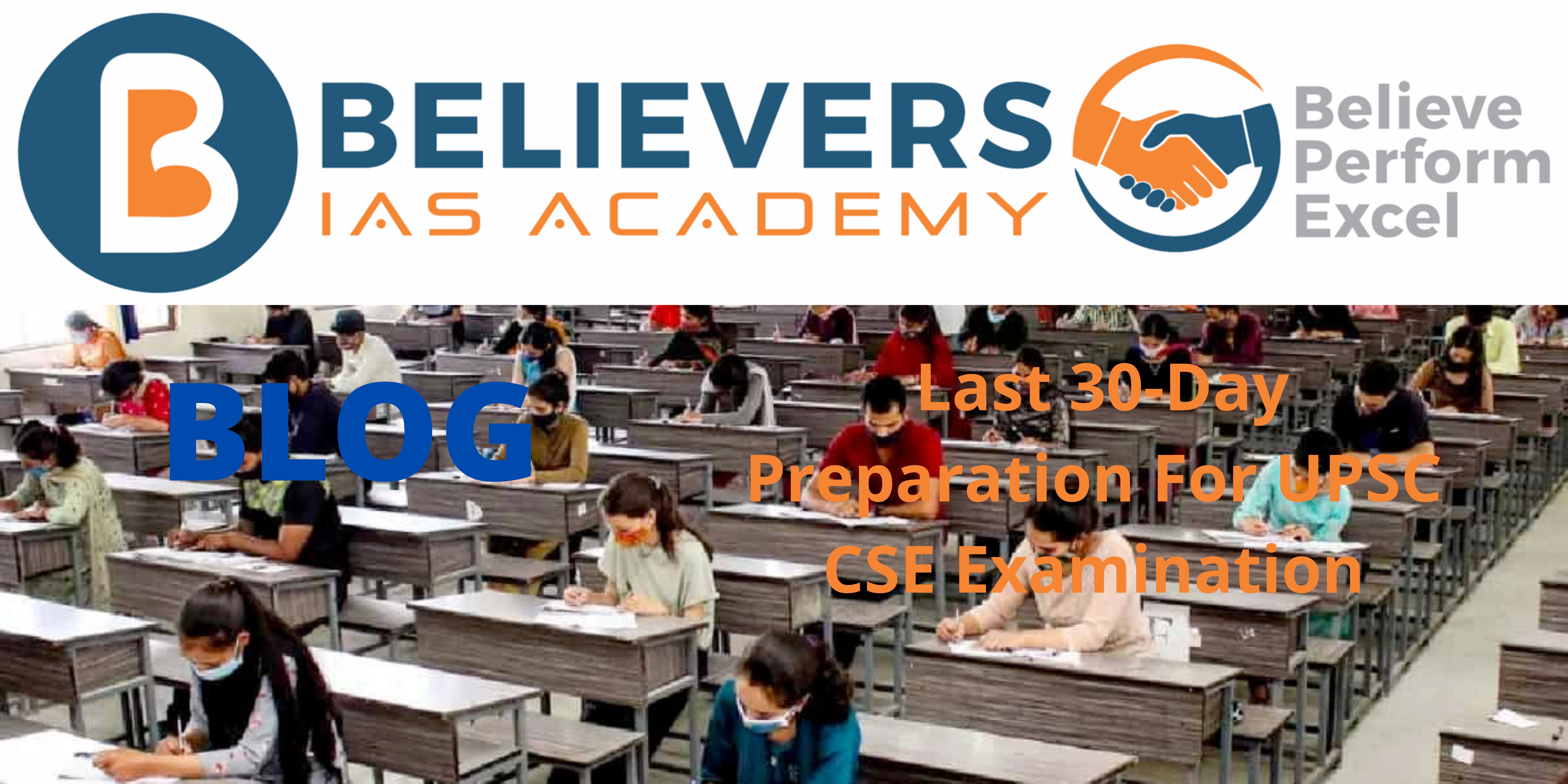Last 30-Day Preparation For UPSC CSE Examination
The UPSC Civil Services Examination (CSE) is one of the most competitive exams in India. It requires a comprehensive understanding of various subjects, excellent analytical skills, and a thorough knowledge of current affairs. To crack the UPSC CSE, aspirants need to prepare diligently, and the last 30 days before the exam are crucial. In this article, we will discuss in detail how to prepare for the UPSC CSE in the last 30 days.
(A) Revision: The Key to Success 
-
- The most important part of the preparation for any exam, including the UPSC CSE, is revision. The final 30 days before the exam are for revision. Candidates must go over all of the major topics, concepts, and current events notes they prepared during their preparation period again. Aspirants should keep in mind that the exam requires not only memorising but also long-term retention of information.
- To revise efficiently, candidates should take short notes or revise from previous notes. It will assist them in recalling all they have studied and identifying any gaps in their knowledge. Furthermore, taking short notes saves time during revision and makes it easier to revise a certain topic.
- Aspirants can utilise mnemonic strategies to remember crucial information, figures, and formulas in addition to revising notes. Mnemonic devices are memory aids that help in the recall of information.
 (B) Mock Tests and Previous Year Papers: The Ultimate Practice
(B) Mock Tests and Previous Year Papers: The Ultimate Practice
-
- Preparing for the UPSC CSE by solving mock tests and previous years’ papers especially CSAT is an efficient method. It assists the candidate in becoming acquainted with the pattern and type of questions asked in the exam. Mock examinations also aid in identifying weak points, which candidates can then work on. Aspirants should try to complete at least one mock test per day and analyse their results to determine their strengths and weaknesses.
- Candidates should imitate the exam environment and take the examination seriously when taking mock tests. They should endeavour to complete the test within the time limit and without being distracted. Following the test, they should evaluate their performance and identify areas for improvement. Furthermore, applicants should solve prior year’s exams to acquire a sense of the exam format and type of questions asked.
(C) Current Affairs: The Game Changer
-
- Current events are important in the UPSC CSE, and aspirants must keep up with the current news and events. They should go over their current affairs notes again and read newspapers and publications to stay up to date on the latest events. Candidates must pay attention to significant national and international events and concerns.
- Furthermore, hopefuls should concentrate on the static section of the curriculum, which encompasses history, geography, politics, economics, and the environment. They should review the key concepts and facts associated with these areas. Candidates might enrich their knowledge and take notes by using the internet. Aspirants can prepare for current events by reading the newspaper daily. They should concentrate on the editorial page and national news. In addition, they can watch news channels and read periodicals such as Yojana, Kurukshetra, and Frontline. Additionally, candidates can keep up with current events by using numerous online tools such as websites and applications. You can always follow our website for updated current affairs
 (D) Time Management: The Key to Productivity
(D) Time Management: The Key to Productivity
-
- Time management is essential when studying for the UPSC CSE. Candidates must arrange their study schedule and set aside time for revision, mock examinations, and current events in the last month. Aspirants should prioritise their studies and concentrate on areas where they need to improve. They should also take breaks between classes to minimise burnout and stay productive.
- Candidates can create and keep to a study schedule to better manage their time. They should set out time for each subject and activity, such as revision, mock tests, and current events. Aspirants should also create a daily to-do list and prioritise the most vital chores. Furthermore, students should strive to finish their daily responsibilities within the time allotted and prevent procrastinating. For Example:
| Time | What to do? |
| 7 AM to 9 AM | Revision of CSAT in 1.5 hrs and answer 20 Questions in 30 min |
| 9 AM to 10 AM | Break |
| 10 AM to 1 PM | Revision of weaker areas of Subject |
| 1 PM to 2 PM | Lunch Break |
| 2 PM to 5 PM | Revision of stronger areas of the subject |
| 5 PM to 8 PM | Revision of current Affairs for two Months(For example starting from May and June) |
| 8 PM to 9.30 PM | Dinner Break |
| 9.30 PM to 11 PM | Revision of both weaker and stronger areas of the particular subjects |
- For Prelims, there are around 4 Pillars: History, Geography, Politics, Economics And Other key subjects like Science and Technology, and General issues related to Environmental Ecology, Biodiversity, and Climate . Using the format table above, revise each subject daily.
- Similarly, cover the year’s current events daily, following a two-month cycle.
- In this manner, you will be able to complete the majority of the topics in two weeks, with the remaining two weeks devoted solely to answering the previous year’s question papers and mock examinations. This will once again assist the candidate in thoroughly revising issues that he may have overlooked.
(E) Health and Fitness: The Key to Success
When preparing for the UPSC CSE, health and fitness are frequently disregarded. They do, however, play an important role in sustaining focus and productivity during the exam. To perform well in the exam, candidates should take care of their physical and mental health. Candidates should consume nutritious, balanced meals and avoid junk food to keep good health. They should also drink plenty of water throughout the day to stay hydrated. To stay fit and ease tension, aspirants should also indulge in physical exercise or yoga. Furthermore, candidates should maintain their mental health by obtaining enough sleep and avoiding stress. They can also meditate or do deep breathing exercises to help them relax and concentrate.
Visit Our Courses @ Programme Believe
Conclusion
The last 30 days before the UPSC CSE exam are crucial, and aspirants must utilize this time effectively. Candidates should focus on revision, solve mock tests and previous year papers, stay updated with current affairs, manage their time efficiently, and take care of their health and fitness. With the right approach and dedication, aspirants can crack the UPSC CSE and achieve their dreams.



 (B) Mock Tests and Previous Year Papers: The Ultimate Practice
(B) Mock Tests and Previous Year Papers: The Ultimate Practice
 (D) Time Management: The Key to Productivity
(D) Time Management: The Key to Productivity

